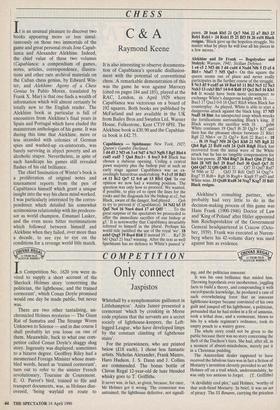At
12 YEAR OLD SCOTCH WHISKY
COMPETITION
ctuVAS REGAL
I2 YEAR OLD SCOTCH WHISKY
Only connect
Jaspistos
In Competition No. 1620 you were in- vited to supply a short account of the Sherlock Holmes story 'concerning the politician, the lighthouse, and the trained cormorant', which Conan Doyle promised would one day be made public, but never was.
There are two other tantalising, un- chronicled Holmes mysteries — The Giant Rat of Sumatra and The Strange Worm Unknown to Science — and in due course I shall probably let you loose on one of them. Meanwhile, back to what one com- petitor called Conan Doyle's shaggy shag story. Ingenuity was displayed, sometimes to a bizarre degree. Geoffrey Riley had a mesmerised Foreign Minister whose mum- bled words, heard as 'trained cormorant', turn out to refer to the sinister French revolutionary, Touraine de Couremont. E. 0. Parrot's bird, trained to file and transport documents, was, as Holmes disc- overed, 'being waylaid en route to Whitehall by a nymphomaniac guillemot in Littlehampton'. Anita James' presented a cormorant 'which by croaking in Morse code explains that the servants are a secret socieiy of lighthouse-keepers, the Left- legged League, who have developed limps by the constant climbing of lighthouse stairs'.
For the prizewinners, who are printed below (£18 each), I chose less fantastic artists. Nicholas Alexander, Frank Munro, Haro Hudson, J. S. Dunn and J. Collins are commended. The bonus bottle of Chivas Regal 12-year-old de luxe blended whisky goes to T. Griffiths.
It never was, in fact, so given, because, for once, Mr Holmes got it wrong. The cormorant was untrained, the lighthouse defective, not signall- ing, and the politician innocent.
It was his own brilliance that misled him. Throwing hypothesis over incoherence, juggling facts to build a theory, and compounding it with encyclopaedic knowledge, he produced a case of such overwhelming force that an innocent lighthouse-keeper became convinced of his own guilt and jumped off his lighthouse, a politician, persuaded that he had stolen in a fit of amnesia, took a lethal dose, and a cormorant, blown to bits by a whole regiment's ordnance, took its empty pouch to a watery grave.
The whole story could not be given to the public because there was no story concerning the theft of the Duchess's tiara. She had, after all, in a moment of absent-mindedness, merely put it in a Christmas pudding.
The Amsterdam dealer supposed to have received the fabulous tiara was in fact a fiction of Moriarty's invention cleverly provided to set Mr Holmes off on a trail which, understandably, he was only too anxious to forget. (T. Griffiths)
'A devilishly cool plot,' said Holmes, 'worthy of that arch-fiend Moriarty. In brief, it was an act of piracy. The SS Benares, carrying the priceless treasure of the Temple of Bogra, hove in sight of the Bishop Rock lighthouse on the night of February 18th, 1893. But that beacon, so reas- suring to all mariners, had been tampered with. An Elder of the Trinity House Brethren, in the pay of a Junior Minister, whose real name we now know to be Thaddeus Carfax, and who in turn took his orders from the villainous Count von Schlossenheim, corrupted the Principal Keeper. As a consequence, the signal emitted on that fateful night was identical to the Wolf Rock lighthouse, several miles to the east. The ship, steering inside the beacon, ran aground on the Western Rocks and broke up, depositing its treasure on the sea-bed. From there, a cormor- ant, trained to salvage jewel-encrusted objets d'art in the shape of fish — for such they were retrieved them and bore them to the Kaiser's agents on the uninhabited island of Annet.
`Happily, in my guise as an ornithologist preparing a monograph on the storm-petrel, I was able to thwart their infernal plan.'
(Watson Weeks) It was the lighthouse-keeper's particular brand of tobacco which quite fortuitously set me on the right track,' explained Holmes. 'An intriguing instance of chaos theory, Watson. "Ready rubbed black shag" put me in mind immediately of phalacrocorax aristotelis, the common shag or green cormorant which is, as you know, plentiful on these coasts. The species is often trained to catch fish. What could be more natural than that
the lighthouse-keeper, an unscrupulous fanatic with anarchistic tendencies — a fact I divined instantly from his somewhat hectic beard and wild-eyed demeanour — should have kept a specially trained killer shag?'
`You mean . . .?'
`Yes, Watson. The distance from lighthouse to shore must have looked an easy swim for a man as fit and as desperate as Sir Maurice Bracegirdle. He waited for high tide, dived the hundred feet or so from his lonely cell, and struck out for shore. The poor fellow never arrived, and the shag enjoyed a rare feast. Count on it, Watson, the unrecognisable corpse with empty eye-sockets lately found at Polperro was that of our missing Attorney-General.'
`Good God! Then the secrets of the Trinity House white slave scandal have gone to the grave with him?' `Yes, Watson.' (Peter Norman) "Pon my soul, Holmes!' I exclaimed. 'Then the politician was all along at the bottom of this horrid thing.' 'On the contrary, Watson. A mere deputy from the Auvergne would not have had the wit to plan it. The culprit was the lighthouse-keeper, a man educated above his station. It was he who posed as M. Bontemps after disposing of his body in the sea.' 'But how on earth did you —?'
'Penetrate his disguise? Simplicity itself, Wat-
son. Did you notice how he always placed himself in the corner of the room? It was a novelty to him, you see. A politician would invariably have taken the very centre of the carpet.'
`And the motive?'
`Ah, Watson. Eternal human folly. The lighthouse-keeper had a fiancée. On holiday in France — well, let us say that she was awed by a handsome foreigner.'
`But the cormorant, Holmes . .
`The key to it all, in more ways than one. They are trained to catch fish, but not to swallow them. Our jealous swain pitched M. Bontemps out of the lighthouse, forgetting that he would need the murdered man's keys to carry out his impersonation. The cormorant retrieved them. I found traces of brass in its bill. The rest was



















































 Previous page
Previous page